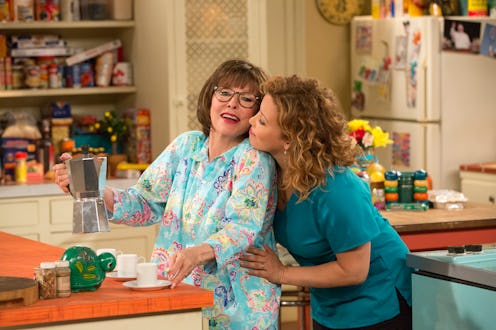
The original series One Day At A Time is fondly remembered for helping to make second-wave feminism more mainstream by portraying a typical American family with a single mother, and the reboot is updating those ideologies for a new generation. In the new Netflix reboot, the typical American family just happens to be Cuban. Not only does the show have a cast with mostly Latina and Latino actors, but the series has a Latina showrunner as well. In an interview with Bustle, One Day At A Time executive producer Gloria Calderon Kellett and actor Justina Machado talk about how their series normalizes the Latin-American experience and is picking up where television legend Norman Lear left off.
Kellett says her writing partner, Mike Royce, also wanted to emphasize female and Latino voices, so together, they put together a diverse writer's room. "Half of our staff is Latin. Half of our staff is female. That is unheard of. Having been the only hispanic person and sometimes the only woman [in the writer's room], so sometimes I was the only woman and the only Latina. That's crazy." The fact that this is a show by, about, and with diverse and Latino people makes a difference.
"It changes the conversation of the room," explains Kellett. "It changes it. It changes it when one of the guys would leave and it would be more women than men because we're pretty equal. The dynamic shifts. So, when you're in a room of all dudes and you're the only lady and you're the only minority, that's a different conversation, so it was very important." Kellett also says that the crew was extremely diverse and the series only had one white male director, which is very rare.
It sends a message that can contribute to societal progress from your living room. Machado says that though many people often discredit actors or don’t take their work seriously, theres value to what they’re doing. "We're making an incredible contribution," she says, "because we're portraying ourselves the way we deserve to be portrayed. We're telling the stories that are universal stories, and we're employing each other and supporting each other, and building each other up. So, I think that it is going to be a domino effect."
This level of representation and boundary pushing should be no surprise. Norman Lear, the creator of the original series, was known for his groundbreaking sitcoms in the '70s and '80s, including All In The Family, Maude, The Jeffersons, and Good Times. "I definitely feel like we have the Norman Lear blessing," says Kellett, "because he's the producer on our show. People know that there's a certain taste level and certain content that he brings with his shows. His branding has given us a little more heft."
"You know," remembers Kellett, "they did a CBS retrospective [on Lear] and they tried to get clips from his original series, and they couldn't air them on television today because Standards and Practices wouldn't allow stuff that was on their network 30 years ago. So, it's incredible that we're able to tell these provocative stories in a family setting, the way it would organically happen for this family."
What other shows could do with a provocative, modern retelling? "I wouldn't mind seeing Fantasy Island," says Machado. "Then, anything with women. I think they're rebooting those two women, Cagney and Lacey, and that was always a great idea to me, because those are two, strong, fabulous characters that are well-rounded. I think there's room to tell new stories, though. I love the fact that we're doing something like that but we have our own spin on it."
Additional reporting by Samantha Rullo